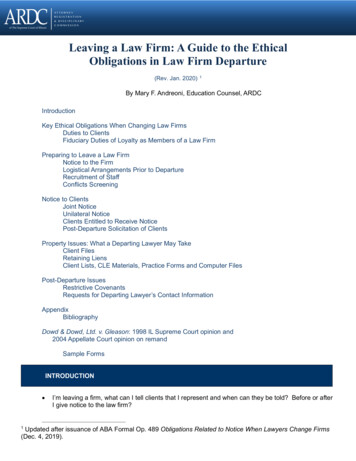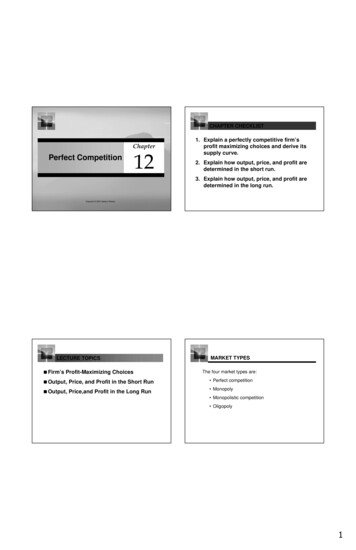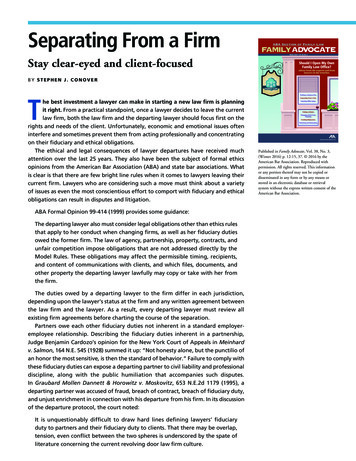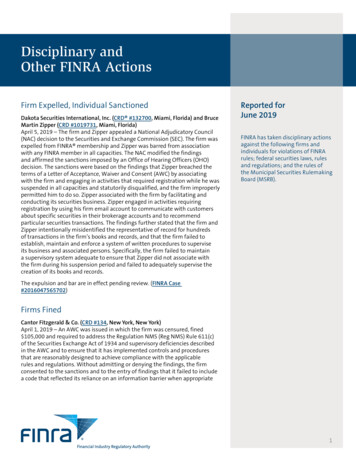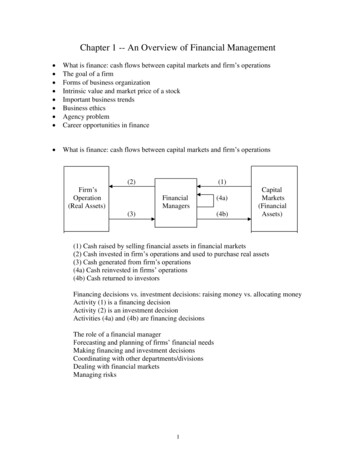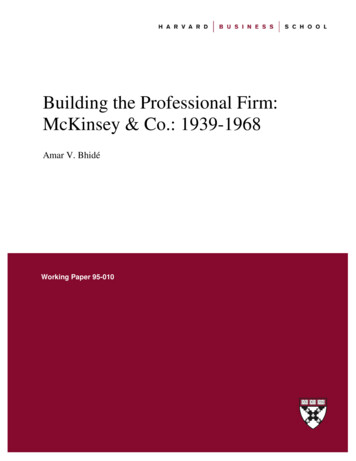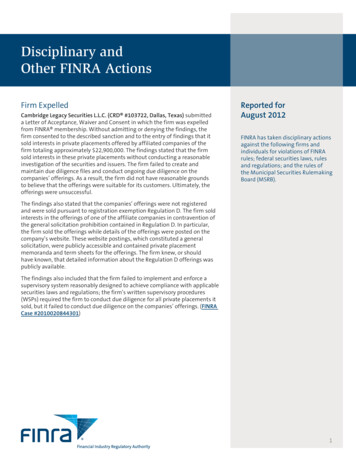
Transcription
Disciplinary andOther FINRA ActionsFirm ExpelledCambridge Legacy Securities L.L.C. (CRD #103722, Dallas, Texas) submitteda Letter of Acceptance, Waiver and Consent in which the firm was expelledfrom FINRA membership. Without admitting or denying the findings, thefirm consented to the described sanction and to the entry of findings that itsold interests in private placements offered by affiliated companies of thefirm totaling approximately 22,900,000. The findings stated that the firmsold interests in these private placements without conducting a reasonableinvestigation of the securities and issuers. The firm failed to create andmaintain due diligence files and conduct ongoing due diligence on thecompanies’ offerings. As a result, the firm did not have reasonable groundsto believe that the offerings were suitable for its customers. Ultimately, theofferings were unsuccessful.Reported forAugust 2012FINRA has taken disciplinary actionsagainst the following firms andindividuals for violations of FINRArules; federal securities laws, rulesand regulations; and the rules ofthe Municipal Securities RulemakingBoard (MSRB).The findings also stated that the companies’ offerings were not registeredand were sold pursuant to registration exemption Regulation D. The firm soldinterests in the offerings of one of the affiliate companies in contravention ofthe general solicitation prohibition contained in Regulation D. In particular,the firm sold the offerings while details of the offerings were posted on thecompany’s website. These website postings, which constituted a generalsolicitation, were publicly accessible and contained private placementmemoranda and term sheets for the offerings. The firm knew, or shouldhave known, that detailed information about the Regulation D offerings waspublicly available.The findings also included that the firm failed to implement and enforce asupervisory system reasonably designed to achieve compliance with applicablesecurities laws and regulations; the firm’s written supervisory procedures(WSPs) required the firm to conduct due diligence for all private placements itsold, but it failed to conduct due diligence on the companies’ offerings. (FINRACase #2010020844301)1
August 2012Firm Fined, Individual SanctionedInstitutional Capital Management, Inc. (CRD #41055, Houston, Texas) and Daniel Lee RitzJr. (CRD #1977521, Registered Principal, Katy, Texas) submitted a Letter of Acceptance,Waiver and Consent in which the firm was censured and fined 25,000. FINRA imposeda lower fine after it considered, among other things, the firm’s revenues and financialresources. Ritz was suspended from association with any FINRA member in any capacityfor 18 months. In light of Ritz’s financial status, no monetary sanctions have been imposed.Without admitting or denying the findings, the firm and Ritz consented to the describedsanctions and to the entry of findings that Ritz held positions in securities in a pledgeaccount as collateral for a letter of credit from a bank on which he was the guarantor.When Ritz received a collateral call on the letter of credit in the amount of 1,251,816.59,he executed a series of unfunded securities transactions that induced the firm’s clearingfirm to improperly extend credit to Ritz and to other firm customers, and effectivelycreated a loan from the clearing firm. The findings stated that the trades were executedbetween related accounts, some of which Ritz himself held and/or controlled, structuredas though there were legitimate buyers intending to fund each purchase; however, noneof the purchases were funded until the last round of trades at the end of the scheme. Ritz,as the executing broker, executed each unfunded transaction internally at the firm. Ritzset the price at which the unfunded transactions were booked, and completed all of thetrade tickets himself. Most of the trades were priced at or near the market at the time theywere executed, so the impact on the market price, if any, was minimal. The findings alsostated that the unfunded transactions effectively created a loan from the clearing firm,which cleared the initial purchase in the amount of approximately 175,000, under falsepretenses. The loan allowed Ritz to partially satisfy the collateral call while retaining controland ownership of the stock in the pledge account. The findings also included that at least 40,000 in profits booked on the unfunded transactions was wired to personal accountsRitz held at other financial institutions.FINRA found that Ritz executed some of the transactions in the scheme between personalaccounts he held and the accounts of other firm customers he controlled and/or ownedand did not involve any change of beneficial ownership (i.e. wash trades). FINRA also foundthat to further his scheme, Ritz created inaccurate and/or incomplete order tickets that thefirm retained, causing the firm to violate Securities Exchange Act Rule 17a-3 and NASD Rule3110. In addition, FINRA determined that the firm’s WSPs did not provide for supervisionreasonably designed to achieve compliance with NASD/FINRA rules or applicable securitieslaws and regulations concerning improper trading activity and wash trades.The suspension is in effect from July 2, 2012, through January 1, 2014. (FINRA Case#2009016581301)2Disciplinary and Other FINRA Actions
August 2012Firms FinedAEI Securities, Inc. (CRD #6158, St. Paul, Minnesota) submitted a Letter of Acceptance,Waiver and Consent in which the firm was censured and fined 20,000. Without admittingor denying the findings, the firm consented to the described sanctions and to the entry offindings that it only retained incoming and outgoing emails spot-checked for compliancepurposes on a weekly basis, which was less than 20 percent of all of its registeredrepresentatives’ incoming and outgoing email correspondence during the relevant timeperiod. The findings stated that the firm printed out and kept hard copies of all emailsspot-checked in a correspondence file for three years. The firm failed, however, to maintainor preserve all email correspondence relating to its business as a broker-dealer for at leastthree years. (FINRA Case #2011025483201)Banc of America Investment Services, Inc. (CRD #16361, Boston, Massachusetts) submitteda Letter of Acceptance, Waiver and Consent in which the firm was censured and fined 50,000. Without admitting or denying the findings, the firm consented to the describedsanctions and to the entry of findings that it improperly allowed its “fund strategiesadvised” customers to forego the receipt of immediate trade confirmations and, instead,to receive trade confirmations on a quarterly basis. The findings stated that for thoseaccounts where the customers opted on the account application to receive periodicaccount statement delivery, the firm sent the customers individual trade confirmationson a quarterly basis instead of sending immediate trade confirmations pursuant toSecurities and Exchange Commission (SEC) Rule 10b-10(a). The findings stated that “fundstrategies-advised” accounts elected to receive trade confirmations on a quarterly basisin lieu of immediate trade confirmations so the firm did not deliver immediate tradeconfirmations for approximately 23,450 transactions valued at 323,475,815. (FINRA Case#2008014187702)Clearview Correspondent Services, LLC (CRD #142785, Richmond, Virginia) submitteda Letter of Acceptance, Waiver and Consent in which the firm was censured and fined 100,000. Without admitting or denying the findings, the firm consented to the describedsanctions and to the entry of findings that it failed to close out fail-to-deliver positions inaccordance with the SEC requirement to immediately purchase or borrow securities of likekind or quantity by no later than the beginning of regular trading hours on the settlementdate (T 4), subject to certain exceptions, or on the third settlement day after settlementdate (T 6) if the position resulted from a long sale or certain bona fide market makingactivity. The findings stated that because the firm was not monitoring its fail-to-deliverpositions, it also failed to provide notification to brokers and dealers from whom it acceptedtrades for clearance and settlement that it had failed to close out fail-to-deliver positionsin equity securities. The findings also stated that the firm failed to implement supervisoryprocedures and systems reasonably designed to ensure compliance with Rule 204T andRule 204 of Regulation SHO. The findings also included that while the firm adopted policiesand procedures that comported with the enhanced close-out requirements of Rule 204Tand Rule 204(a), it did not follow these procedures.Disciplinary and Other FINRA Actions3
August 2012FINRA found that the firm failed to supervise firm staff responsible for monitoringits fail-to-deliver obligations to ensure they adequately understood the impact of thechanges under the rules. As a result, firm staff did not close out fail-to-deliver positions inaccordance with these new rules. Firm employees continued to follow the requirements inplace prior to the enhanced delivery and not close out requirements until a later date. FINRAalso found that the firm failed to have any WSPs in place that addressed the notificationrequirements of Rule 204T(c) and Rule 204(c) until a later date, so it failed to provide therequired notifications to brokers or dealers from whom it accepted trades for clearanceand settlement that it had failed to close out fail-to-deliver positions in equity securities.(FINRA Case #2010023517501)ConvergEx Prime Services LLC (CRD #140185, Alpharetta, Georgia) submitted a Letterof Acceptance, Waiver and Consent in which the firm was censured, fined 13,500 andrequired to revise its WSPs regarding Order Audit Trail System (OATSTM) reporting. Withoutadmitting or denying the findings, the firm consented to the described sanctions and to theentry of findings that it failed to transmit almost all of its Reportable Order Events (ROEs)to OATS during the review period. The findings stated that the firm’s supervisory systemdid not provide for supervision reasonably designed to achieve compliance with applicablesecurities laws, regulations and FINRA rules concerning OATS reporting. (FINRA Case#2011027286401)E*Trade Securities LLC (CRD #29106, New York, New York) submitted a Letter of Acceptance,Waiver and Consent in which the firm was censured and fined 75,000. Without admittingor denying the findings, the firm consented to the described sanctions and to the entry offindings that it failed to report to FINRA the name and other identifying information of theregistered representatives named in customer complaints it received alleging the registeredrepresentatives’ misconduct. The findings stated that the vast majority of the complaintsalleged sales practice violations like unauthorized transactions, mismanagement,unsuitability and misrepresentations related to auction rate securities. The findings alsostated that on statistical and summary reports concerning complaints, the firm incorrectlyreported the location of the branch office where the grievance occurred. In some instances,the firm reported that the complaints originated from the locations where the complaintswere reviewed. The findings also included that the firm failed to report complaintsconcerning auction rate securities that were sales practice related—those complaintsmainly alleged illiquidity, misrepresentations and poor recommendations. One of thecomplaints alleged fraud and another alleged unauthorized trading. Rather than report thecomplaints itself, the firm’s sister broker-dealer, with which it shared some overlappingcompliance systems, reported the complaints, and incorrectly reported them under anon-sales practice problem code for Account Administration and Processing (Code 61).(FINRA Case #2010020952901)4Disciplinary and Other FINRA Actions
August 2012First Midwest Securities, Inc. (CRD #21786, Bloomington, Illinois) submitted a Letter ofAcceptance, Waiver and Consent in which the firm was censured and fined 75,000.Without admitting or denying the findings, the firm consented to the described sanctionsand to the entry of findings that it failed to establish and maintain a supervisory systemand establish, maintain and enforce WSPs reasonably designed to review the suitability ofequity transactions to detect and prevent excessive trading. The findings stated that thefirm did not utilize exception reports to assist in detecting patterns of unsuitable excessivetrading. The firm’s clearing firms made exception reports available that identified turnoverand commission-to-equity ratio in customer accounts. The firm did not begin using suchreports until a later time. The findings also stated that to identify unsuitable excessivetrading, the firm relied on the daily review of trade blotters as well as turnover ratio reportsthat were prepared manually and reviewed by the firm’s compliance staff on a semi-annualbasis. The manually-prepared reports did not address cost-to-equity ratios in accounts.The findings also included that the firm’s WSPs provided inadequate guidance on howthe reports should be prepared and used. The firm’s WSPs did not offer specific guidanceon how accounts would be reviewed for excessive trading or provide for the supervisorymeasures that would be implemented to detect and prevent such activity. FINRA foundthat the firm’s procedures called for a semi-annual review of an Active Account Report,but the firm did not utilize such a report. Although the firm contacted customers whoseaccounts were subject to active trading by sending them an Intent to Maintain an ActiveAccount Form, those forms did not provide customers with details such as the amount ofcommissions paid. FINRA also found that as a result of the firm’s supervisory deficiencies,the firm failed to identify and prevent a registered representative’s excessive trading incertain customer accounts. (FINRA Case #2009020663201)Fordham Financial Management, Inc. (CRD #20996, New York, New York) submitteda Letter of Acceptance, Waiver and Consent in which the firm was censured and fined 10,000. Without admitting or denying the findings, the firm consented to the describedsanctions and to the entry of findings that it improperly reported Execution or CombinedOrder/Execution Reports to OATS with a reporting exception code of “M.” The findingsstated that the firm transmitted reports to OATS that contained inaccurate capacity codes.(FINRA Case #2010023689701)HSBC Securities (USA) Inc. (CRD #19585, New York, New York) submitted a Letter ofAcceptance, Waiver and Consent in which the firm was censured and fined 45,000.Without admitting or denying the findings, the firm consented to the described sanctionsand to the entry of findings that it failed to timely report ROEs to OATS; reportedExecution or Combined Order/Execution Reports that contained inaccurate, incompleteor improperly formatted data; and transmitted Route or Combined Order/Route Reportsto OATS that OATS was unable to link to the related order routed to NASDAQ or link to thecorresponding new order transmitted by the destination member firm due to inaccurate,incomplete or improperly formatted data. The firm failed to transmit numerous ROEsto OATS during a review period. The findings stated that the firm transmitted reports toDisciplinary and Other FINRA Actions5
August 2012OATS that contained inaccurate destination codes. The findings also stated that the firmfailed, within 90 seconds after execution, to transmit last sale reports of transactions indesignated securities to the FINRA/NASDAQ Trade Reporting Facility (FNTRF), and failed,within 90 seconds after execution, to transmit last sale reports of transactions in overthe-counter (OTC) equity securities to the OTC Reporting Facility (OTCRF). (FINRA Case#2008015436301)Interactive Brokers LLC (CRD #36418, Greenwich, Connecticut) submitted a Letter ofAcceptance, Waiver and Consent in which the firm was censured and fined 550,000,which includes disgorgement of approximately 6,000 in commissions received. Withoutadmitting or denying the findings, the firm consented to the described sanctions and to theentry of findings that it executed customer short sales in the securities of financial servicesfirms covered by an SEC Emergency Order, which prohibited short selling in any firmsidentified in the appendix to the Emergency Order. The firm obtained commissions totalingapproximately 6,000 for effecting these short-sale transactions. The findings stated thatthe firm also failed to comply with SEC Rules 204T(a) and 204(a). Prior to the enactment ofRule 204T(a), the firm devised a policy that did not mandate that fail-to-deliver positionsresulting from short sale transactions be closed out no later than the time of the market’sopen on T 4; the firm’s policy permitted the close out of fail-to-deliver positions resultingfrom short sales to occur shortly after the market’s open, generally within minutes afterthe market’s open. The findings also stated that for more than two years, the firm failedto timely close out its fail-to deliver positions in approximately 34,000 short sale positions,violating SEC Rules 204T(a) and 204(a). The findings also included that the firm failed toput into place a supervisory system reasonably designed to achieve compliance with Rules204T(a) and 204(a).FINRA notified the firm that its policy relating to Rule 204T(a) and Rule 204(a) was deficientbecause it did not mandate that all fail-to-deliver positions resulting from short saletransactions be closed out no later than the market’s open on T-4. The firm took stepsto address the problem and correct its supervisory controls, but the controls remaineddeficient because the firm failed to timely execute the buy-ins, closing out fail-to-deliverpositions in short sales on approximately 4,000 occasions, thereby failing to implementan adequate supervisory system to achieve compliance with Rule 204T(a) and Rule 204(a).(FINRA Case #2010022582001)Isaak Bond Investments, Inc. (CRD #7413, Denver, Colorado) submitted a Letter ofAcceptance, Waiver and Consent in which the firm was censured and fined 22,500.Without admitting or denying the findings, the firm consented to the described sanctionsand to the entry of findings that it failed to report information regarding transactionseffected in municipal securities to the Real-time Transaction Reporting System (RTRS)in the manner prescribed by Municipal Securities Rulemaking Board (MSRB) Rule G-14RTRS Procedures and the RTRS Users Manual; the firm failed to report information about6Disciplinary and Other FINRA Actions
August 2012such transactions to an RTRS Portal within 15 minutes of trade time. The findings statedthat the firm failed to document the correct trade time on trade memorandum for thesetransactions. The findings also stated that the firm failed to report transactions in TradeReporting and Compliance Engine (TRACE )-eligible securities to TRACE within 15 minutesof execution time. The firm failed to accurately report information in these instances.The findings also stated that the firm failed to show the correct execution time on somebrokerage order memoranda. (FINRA Case #2009018643001)Jefferies & Company, Inc. (CRD #2347, New York, New York) submitted a Letter ofAcceptance, Waiver and Consent in which the firm was censured, fined 30,000 andrequired to pay 19,848.15, plus interest, in restitution to customers. Without admittingor denying the findings, the firm consented to the described sanctions and to the entryof findings that it bought or sold corporate bonds from or to customers, and failed to buyor sell bonds at a price that was fair, taking into consideration all relevant circumstances,including market conditions with respect to each bond at the time of the transaction, theexpense involved and that the firm was entitled to a profit. (FINRA Case #2008013511201)LPL Financial LLC (CRD #6413, Boston, Massachusetts) submitted a Letter of Acceptance,Waiver and Consent in which the firm was censured and fined 17,500. Without admittingor denying the findings, the firm consented to the described sanctions and to the entry offindings that it failed to report information regarding transactions effected in municipalsecurities to the RTRS in the manner prescribed by MSRB Rule G-14 RTRS Procedures andthe RTRS Users Manual; the firm failed to report information about such transactions toan RTRS Portal within 15 minutes of trade time. The findings stated that the firm failedto report the correct trade time to the RTRS for these transactions, and failed to show thecorrect execution time on some brokerage orders memoranda. The findings also stated thatthe firm failed to report S1 transactions in TRACE-eligible agency debt securities to TRACEwithin 15 minutes of the execution time. (FINRA Case #2010024975401)Merrill Lynch, Pierce, Fenner & Smith Incorporated (CRD #7691, New York, New York)submitted a Letter of Acceptance, Waiver and Consent in which the firm was censuredand fined 450,000. Without admitting or denying the findings, the firm consented to thedescribed sanctions and to the entry of findings that it offered a wide range of structuredproducts to retail customers and, between January 1, 2006, and March 1, 2009, effectedapproximately 650,000 structured product purchases, of which greater than 50 percentinvolved structured product offerings the firm’s parent company issued. The findings statedthat the firm, in supervising sales of securities to retail customers, relies upon automatedexception-based reporting systems to flag transactions and/or accounts that met certainpre-defined criteria; but prior to March 1, 2009, did not have an exception-based reportingsystem that specifically monitored for potentially unsuitable concentration levels instructured products in customer accounts. (FINRA Case #2010022011901)Disciplinary and Other FINRA Actions7
August 2012Merrill Lynch Professional Clearing Corp. (CRD #16139, New York, New York) submitteda Letter of Acceptance, Waiver and Consent in which the firm was censured and fined 80,000. Without admitting or denying the findings, the firm consented to the describedsanctions and to the entry of findings that it failed to retain instant messages sent andreceived by employees who joined the firm as part of an entity the firm acquired and whosent and received instant messages using non-firm messaging systems. The findings statedthat the firm failed to retain sender/recipient information for electronic messages that thesame acquired entity’s legacy employees sent and received through a proprietary tradingsystem. The electronic system also did not automatically verify the quality and accuracyof the storage media recoding process. The electronic messages sent and received via theproprietary trading system were not stored accurately. The findings also stated that thesystem could not readily download complete and accurate indexes and records given thatthe system did not retain accurate and complete sender/recipient information. (FINRA Case#2009016334001)Merrimac Corporate Securities, Inc. (CRD #35463, Altamonte Springs, Florida) was fined 18,500. The National Adjudicatory Council (NAC) imposed the sanction following appealof an Office of Hearing Officers (OHO) decision. The sanction was based on findings thatthe firm sold private placements, real estate investment trusts (REITs), limited partnershipsand direct participation programs not authorized by its FINRA membership agreement,and that the sale of each was a material change in its business that required the filing ofan application for approval of a change in business operations and FINRA approval. Thefindings stated that the firm failed to establish, maintain and enforce WSPs to supervisethe sale of these products and variable annuities. The findings also stated that the firmfailed to maintain adequate books and records with respect to emails by willfully failingto preserve all business-related incoming emails and internal emails, willfully failing topreserve emails in an easily accessible place, willfully failing to preserve emails in a nonerasable, non-rewritable format, and failing to notify FINRA that its emails would bemaintained on electronic storage media. FINRA found that the firm failed to make and keepcurrent blotters for its direct application mutual fund and variable annuity businesses.Because these actions were deemed willful violations, Merrimac is statutorily disqualified.(FINRA Case #2007007151101)Morgan Stanley Smith Barney LLC (CRD #149777, Purchase, New York) submitted a Letterof Acceptance, Waiver and Consent in which the firm was censured and fined 450,000.Without admitting or denying the findings, the firm consented to the described sanctionsand to the entry of findings that a junior trader was responsible for trading federal agencyproducts (Fannie Mae and Freddie Mac) in a cash book and futures contracts (Eurodollarand Treasuries) in a futures book. The junior trader was permitted to trade remotely sohe could trade after hours and react to global events. The findings stated that at the endof one trading day, the trader had accumulated a futures position of approximately 744million, more than double the agency desk’s limit of 350 million and several multiplesover his position limit of 116 million. The findings also stated that he traded at home8Disciplinary and Other FINRA Actions
August 2012and overnight so that, by the following morning, he had further exceeded his positionlimit with holdings in Eurodollar and Treasury futures of 1.33 billion. The market turnedagainst him that morning and he attempted unsuccessfully to reduce his exposure andsuffered losses. The findings also stated that in the morning, the firm identified on a T 1basis a risk anomaly that was traced to the trader and cut off his access to the tradingsystem. The trader had reduced the cumulative position to 740 million, but the five-yearagency book sustained a realized loss of 4.7 million. The firm liquidated 75 percent of theremaining contracts and liquidated the rest the following day, thereby realizing additionallosses. Based on the trader’s trading over two days, the firm’s account sustained realizedlosses totaling approximately 14.9 million. Since these were proprietary positions, therewasn’t any customer loss. The findings also included that the firm did not have adequatesafeguards or controls in place to detect that the trader had exceeded his position limitby the end of the trading day or to prevent him from exceeding his position limit whiletrading remotely overnight. The trading desk did not have a consolidated view to captureand monitor trading activity across products and systems, which contributed to the firm’sfailure to detect that the trader had exceeded the agency’s desk and his own position limitby the end of the trading day. The firm also did not have sufficient controls to prevent thetrader from exceeding his position limit while trading remotely overnight. (FINRA Case#2009018841002)NFP Securities, Inc. (CRD #42046, Austin, Texas) submitted a Letter of Acceptance, Waiverand Consent in which the firm was censured, fined 43,121.39, and ordered to pay 43,121.39, plus interest, in restitution to a customer. Without admitting or denying thefindings, the firm consented to the described sanctions and to the entry of findings thatit charged excessive markups on several riskless principal corporate bond transactions ina customer’s account. The findings stated that, in each instance, the firm purchased thebonds, added a markup and immediately, on the same day of purchase, sold the bonds tothe customer. The firm’s markups on the transactions were not fair and reasonable, takinginto consideration all relevant circumstances, including the fact that the price was notreasonably related to the amount the firm had contemporaneously paid for the bonds, andthe fact that the firm did not provide any evidence to overcome the presumption that itscontemporaneous cost constituted the best measure of the prevailing market price of thebonds sold to the customer. The markups the firm charged in the transactions exceededthe amounts other dealers in similar transactions charged by 43,121.39. The findingsalso stated that the firm’s supervisory system and WSPs were not reasonably designed toensure that prices at which it sold debt securities to customers in principal transactionswere fair and reasonable, nor designed to achieve compliance with all applicable laws, rulesand regulations pertaining to effecting principal transactions with customers. The findingsalso included that the firm’s WSPs in effect did not address or discuss, to any materialextent, Interpretative Material (IM)-2440-1 or IM-2440-2, and did not contain proceduresfor weighing or applying, including how to weigh or apply, the various factors set forth inthose provisions in reviewing and evaluating the fairness of prices in principal transactionsDisciplinary and Other FINRA Actions9
August 2012with customers. The firm’s procedures also did not address how supervisory reviews ofmarkups and markdowns in principal transactions with customers would be conducted.(FINRA Case #2009016273001)R. Seelaus & Co., Inc. (CRD #14974, Summit, New Jersey) submitted a Letter of Acceptance,Waiver and Consent in which the firm was censured, fined 15,000 and ordered to pay 5,995.35, plus interest, in restitution to customers. Without admitting or denying thefindings, the firm consented to the described sanctions and to the entry of findings that, intransactions and pairs of transactions, it purchased municipal securities for its own accountfrom a customer and/or sold municipal securities for its own account to a customer at anaggregate price (including any markdown or markup) that was not fair and reasonable,taking
firm retained, causing the firm to violate Securities Exchange Act Rule 17a-3 and NASD Rule 3110. In addition, FINRA determined that the firm's WSPs did not provide for supervision reasonably designed to achieve compliance with NASD/FINRA rules or applicable securities laws and regulations concerning improper trading activity and wash trades.

